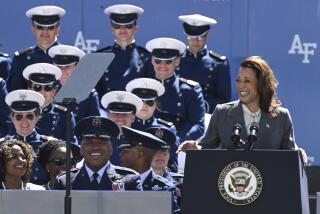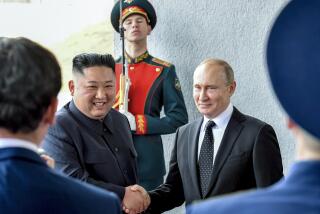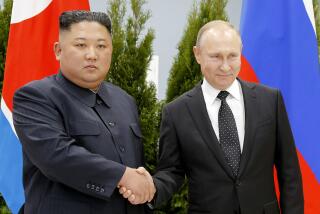High-Level N. Korean to Come for U.S. Talks
MOSCOW â After months of midlevel talks, North Korea and the United States have agreed to take their delicate diplomatic dance to a higher level, with a senior North Korean diplomat visiting Washington at the end of March, State Department spokesman James P. Rubin said Sunday.
Rubin said the North Koreans have accepted a standing invitation extended by the U.S. for a senior member of the regime in Pyongyang to travel to Washington. He said the agreement came after a week of talks in Berlin between delegations headed by U.S. negotiator Charles Kartman and North Korean Vice Foreign Minister Kim Gye Gwan.
The development constitutes the next, albeit modest, step down a path first sketched out last year by former Defense Secretary William J. Perry after he headed a major review of U.S. policy toward North Korea. That review concluded that the most effective way to curtail Pyongyangâs behavior as a major producer of missile and other weapon technologies and a sponsor of terrorism would be to engage the regime diplomatically.
Rubin said that Kim and Kartman will hold a preparatory meeting in New York late next month, with the high-level visit occurring about a month later.
While there was no announcement from either side as to who would head the high-level North Korean delegation, it is widely expected to be Kang Suk Chu, North Koreaâs first deputy foreign minister. Perry and one of the State Departmentâs most senior officers, Wendy Sherman, are expected to lead the U.S contingent.
âThe two sides agreed that this visit would provide the best opportunity for serious talks and progress on issues central to peace and stability in Northeast Asia and the Asia-Pacific region, including improving U.S.-[North Korean] relations,â Rubin said in a written statement released shortly before Secretary of State Madeleine Albright arrived here.
A North Korean statement concerning the agreement said the two sides pledged to discuss a number of issues in the high-level talks, âincluding the removal of our country from the terrorist list.â Rubin said the terrorism issues will be discussed but that there had been no commitment to remove North Korea from the State Department list that singles out seven countries (Cuba, Iran, Iraq, Libya, North Korea, Sudan and Syria) for punitive measures because they are believed to sponsor terrorist acts.
Instead, he said any such decision would depend on Pyongyang fulfilling what he termed âthe relevant criteria.â He did not elaborate.
The U.S. also hopes to discuss other sensitive issues, including making permanent a temporary North Korean moratorium on ballistic missile tests. Pyongyangâs test-firing of a ballistic missile over Japan during the summer of 1998 triggered alarm bells throughout the region.
More to Read
Sign up for Essential California
The most important California stories and recommendations in your inbox every morning.
You may occasionally receive promotional content from the Los Angeles Times.










